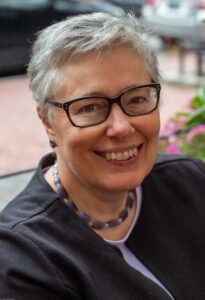
During a transition, you can’t always see the path ahead clearly. That was certainly true for me, and my own transition story has had different chapters, with both professional and personal components.
I began my career at the New England Journal of Medicine (stupendous luck!). Several jobs later, after relocating and marrying a PhD student in English, I became the managing editor at Hypertension. But when my husband landed a promotion at Wake Forest University, I had to leave my wonderful job—back then, remote work didn’t exist. My career at journals was ending.
During our house-hunting trip, I met with a department chair at Wake Forest. Unbeknownst to me, he had been looking for a medical editor for years. But they needed someone who had experience with research grant applications, and I had none. He said, “Don’t worry, I’ll teach you.” And he did.
The work was overwhelming at first, but thanks largely to my very patient boss, I became familiar with the acronyms, the do’s and don’ts, and the strategies behind successful proposal writing. That position became the foundation of my 28-year career at Wake Forest—and in the last decade or so, I was the only medical editor at the institution. Gradually, the workload grew punishing, and my enthusiasm for it waned.
One day, I was surprised to receive an email from a researcher who had left Wake Forest, but wanted me to continue editing his proposals. Although at first the work was only occasional, my client was an enthusiastic source of referrals, and the assignments multiplied. Eventually, I realized that I regained my lost enthusiasm when I worked for myself. I began considering how to transition to a full-time freelance editor.
For anyone weighing a change to freelancing, based on my experience, I offer 3 pieces of advice.
- Take your time, if possible. I took 2 years, during which I could accept assignments at a sustainable pace, do some marketing, and make financial projections. Importantly, by including my then-employer in my plans, they have remained one of my biggest clients.
- Consider how the flexibility of freelancing can enable positive changes in your life. In my first year as a full-time freelancer, my husband and I bought a second home in Santa Fe, New Mexico, where we now spend most of the year. Living the dream, as they say.
- Be realistic. Swings in income and workload are common. Marketing yourself may be distasteful. Finally, it may take time for your business to flourish. While I’ve had a taste of these, nothing was a deal-breaker, and I’ve learned from each experience.
Since beginning my business in 2018, I’ve worried about unnecessary things (enough work) and adjusted to unanticipated things (the pandemic). Nonetheless, my quality of life has improved immensely, I’ve grown my skill set, and I’ve been financially successful thanks to my generous colleagues and clients. Despite being a risk-averse person, the unpredictable path of transition has been deeply rewarding for me—in multiple ways.
Karen Potvin Klein, MA, ELS, MWC, is Owner, Clarus Editorial Services, Santa Fe, NM.
Opinions expressed are those of the authors and do not necessarily reflect the opinions or policies of the Council of Science Editors or the Editorial Board of Science Editor.
